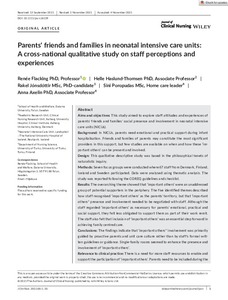Parents' friends and families in neonatal intensive care units: A cross-national qualitative study on staff perceptions and experiences
Flacking Renée; Haslund-Thomsen Helle; Jònsdòttir Rakel; Poropudas Suvi; Axelin Anna
https://urn.fi/URN:NBN:fi-fe2022012710823
Tiivistelmä
Aims and objectives
This study aimed to explore staff attitudes and experiences of parents' friends and families' social presence and involvement in neonatal intensive care units (NICUs).
Background
In NICUs, parents need emotional and practical support during infant hospitalisation. Friends and families of parents may constitute the most significant providers in this support, but few studies are available on when and how these ‘important others’ can be present and involved.
Design
This qualitative descriptive study was based in the philosophical tenets of naturalistic inquiry.
Methods
Seven focus groups were conducted where 67 staff from Denmark, Finland, Iceland and Sweden participated. Data were analysed using thematic analysis. The study was reported following the COREQ guidelines and checklist.
Results
The overarching theme showed that ‘important others’ were an unaddressed group of potential supporters in the periphery. The five identified themes described how staff recognised ‘important others’ as the parents' territory, but that ‘important others'’ presence and involvement needed to be negotiated with staff. Although the staff regarded ‘important others’ as necessary for parents' emotional, practical and social support, they felt less obligated to support them as part of their work remit. The staff also felt that inclusion of ‘important others’ was an essential step forward in achieving family centred care.
Conclusions
The findings indicate that ‘important others'’ involvement was primarily guided by proactive parents and unit care culture rather than by staff's formal written guidelines or guidance. Single-family rooms seemed to enhance the presence and involvement of ‘important others’.
Relevance to clinical practice
There is a need for more staff resources to enable and support the participation of ‘important others’. Parents need to be included during the development of policies to provide their experiences. Finally, more research is needed on what parents wish from their ‘important others’
Kokoelmat
- Rinnakkaistallenteet [27094]
